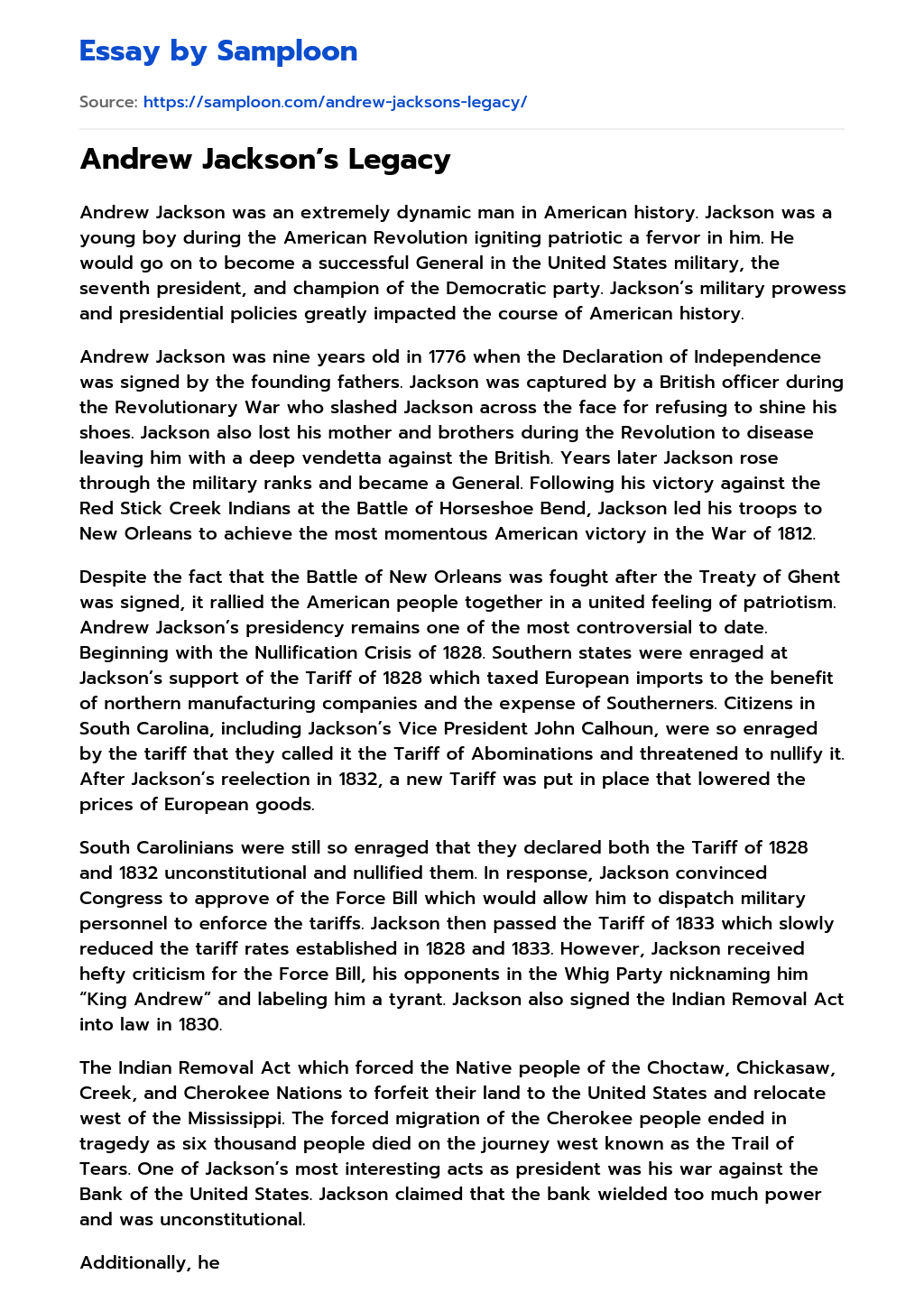Andrew Jackson Legacy And Achievements: A Comprehensive Exploration
Andrew Jackson's legacy and achievements have left an indelible mark on American history. As the seventh President of the United States, his leadership style, policies, and impact on the nation continue to be debated by historians and scholars alike. This article delves into the life, accomplishments, and controversies surrounding Andrew Jackson, offering a balanced perspective on his contributions to the United States.
Known as the "People's President," Andrew Jackson transformed the political landscape of America during his tenure. His presidency marked a significant shift in how the government interacted with the public, emphasizing populist policies and the expansion of democracy. Through his actions, Jackson left a legacy that shaped the nation's political and social fabric.
This article will explore Andrew Jackson's legacy and achievements in detail, examining his presidency, key policies, and lasting impact on the United States. By the end of this piece, you'll have a comprehensive understanding of why Andrew Jackson remains one of the most influential figures in American history.
Read also:Asados Sinaloa The Ultimate Flavor Experience Thats Taking The World By Storm
Table of Contents
- Biography of Andrew Jackson
- Andrew Jackson's Presidency
- Key Policies and Reforms
- Impact on Indigenous Communities
- Economic Contributions
- Military Career
- Controversies Surrounding Andrew Jackson
- Cultural Impact
- Modern Perspective on Jackson's Legacy
- Conclusion and Final Thoughts
Biography of Andrew Jackson
Andrew Jackson was born on March 15, 1767, in the Waxhaws region, which is now part of the Carolinas. His early life was marked by hardship and loss, as he became an orphan during the American Revolutionary War. Despite these challenges, Jackson rose to prominence through determination and resilience.
Early Life and Education
Andrew Jackson's childhood was shaped by the Revolutionary War. At the age of 13, he served as a courier in the Continental Army. His brothers and mother died during the war, leaving him orphaned at a young age. Jackson's formal education was limited, but he developed a strong sense of independence and leadership from his experiences.
Personal Data
| Full Name | Andrew Jackson |
|---|---|
| Birth Date | March 15, 1767 |
| Death Date | June 8, 1845 |
| Place of Birth | Waxhaws Region (Carolina Territory) |
| Spouse | Rachel Donelson Jackson |
| Occupation | President, Military Officer, Lawyer |
Andrew Jackson's Presidency
Andrew Jackson served as the seventh President of the United States from 1829 to 1837. His presidency was characterized by a strong emphasis on democracy and the common man. Jackson's leadership style was often described as forceful and decisive, reflecting his military background.
Key Events During His Presidency
- Establishment of the spoils system, which rewarded political supporters with government positions.
- Opposition to the Second Bank of the United States, which he viewed as a tool of elite interests.
- Implementation of the Indian Removal Act, which had devastating consequences for Native American communities.
Key Policies and Reforms
Andrew Jackson's presidency was marked by several significant policies that reshaped the American political landscape. His focus on decentralizing power and empowering the common citizen set a new precedent for governance.
Democratization of Politics
Jackson championed the expansion of voting rights to all white males, regardless of property ownership. This policy significantly broadened the electorate and reinforced his image as the "People's President."
Economic Reforms
Jackson opposed the Second Bank of the United States, arguing that it concentrated too much economic power in the hands of a few. His veto of the bank's recharter and subsequent "Bank War" were defining moments of his presidency.
Read also:Leslie The Label Your Ultimate Guide To The Iconic Fashion Brand
Impact on Indigenous Communities
One of the most controversial aspects of Andrew Jackson's legacy is his role in the forced removal of Native American tribes from their ancestral lands. The Indian Removal Act of 1830 led to the infamous Trail of Tears, during which thousands of Native Americans were forcibly relocated.
Trail of Tears
The Trail of Tears refers to the forced migration of several Native American tribes, including the Cherokee, Creek, and Seminole, from their homelands in the southeastern United States to territories west of the Mississippi River. This tragic event resulted in the deaths of thousands due to harsh conditions and disease.
Economic Contributions
Andrew Jackson's economic policies had a lasting impact on the United States. By opposing the Second Bank of the United States, he sought to decentralize financial power and promote economic equality. However, his actions also contributed to economic instability, as evidenced by the Panic of 1837.
Specie Circular
In an effort to curb speculation and stabilize the economy, Jackson issued the Specie Circular, which required payment for government land in gold or silver. While this policy aimed to reduce inflation, it ultimately contributed to the economic downturn following his presidency.
Military Career
Andrew Jackson's military career played a crucial role in shaping his leadership style and public image. His victories in battles such as the Battle of New Orleans during the War of 1812 cemented his reputation as a national hero.
Battle of New Orleans
The Battle of New Orleans was a decisive victory for American forces, led by Andrew Jackson, against the British. Although the battle occurred after the signing of the Treaty of Ghent, it solidified Jackson's status as a military leader and national symbol of resilience.
Controversies Surrounding Andrew Jackson
Andrew Jackson's legacy is not without controversy. His policies and actions have sparked debates about their long-term effects on the nation and marginalized communities.
Indian Removal Act
The Indian Removal Act remains one of the most contentious aspects of Jackson's presidency. Critics argue that his policies were motivated by racial prejudice and resulted in the suffering and displacement of countless Native Americans.
Bank War
Jackson's opposition to the Second Bank of the United States was met with both praise and criticism. While some viewed it as a victory for the common man, others saw it as an overreach of presidential power that destabilized the economy.
Cultural Impact
Andrew Jackson's influence extends beyond politics and economics. His image has been immortalized on the $20 bill, and his name is associated with the era of Jacksonian Democracy. However, modern interpretations of his legacy often emphasize the need for a more nuanced understanding of his contributions.
Modern Representation
In recent years, there has been a push to reassess Jackson's place in American history. Debates over the removal of his image from the $20 bill highlight the evolving cultural perception of his legacy and the importance of acknowledging the complexities of historical figures.
Modern Perspective on Jackson's Legacy
Today, Andrew Jackson's legacy is viewed through a multifaceted lens. While his contributions to democracy and economic reform are acknowledged, his policies toward Native Americans and other marginalized groups remain a point of contention.
Reevaluating Historical Figures
As society continues to grapple with issues of equality and justice, there is a growing recognition of the need to reevaluate historical figures like Andrew Jackson. This process involves acknowledging both their achievements and their shortcomings to gain a more complete understanding of history.
Conclusion and Final Thoughts
In conclusion, Andrew Jackson's legacy and achievements have left an indelible mark on American history. His presidency was marked by significant reforms, controversial policies, and a lasting impact on the nation's political and social fabric. While his contributions to democracy and economic reform are undeniable, his actions toward Native Americans and other marginalized groups continue to spark debate.
We invite you to share your thoughts on Andrew Jackson's legacy in the comments below. Engaging in thoughtful discussions about history is essential for understanding our past and shaping our future. Additionally, feel free to explore other articles on our site for more insights into American history and its influential figures.


